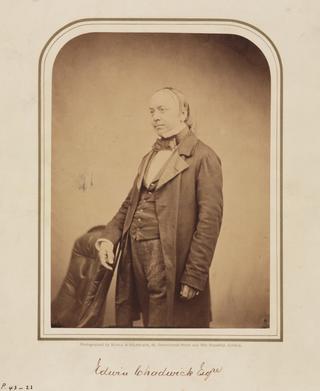
Sir Edwin Chadwick 1800 - 1890
- occupation:
- Social reformer and civil servant
- Nationality:
- British
- born in:
- Manchester, Manchester urban district, Greater Manchester, England, United Kingdom
Edwin Chadwick was born in Manchester in 1800. While studying to become a lawyer in London, Chadwick became interested in political and social reform. He became one of the most important public health activists of the 1800s.
Chadwick believed in using science as a means for social improvement and in 1832 he was asked to serve on a royal commission to investigate the effectiveness of the Poor Laws - a system of social security in place since 1601. His work contributed to the 1834 Poor Law Amendment Act.
In the course of his investigations into the living conditions of the poor, Chadwick became interested in the problem of sanitation. As a confirmed believer in miasma theories he was convinced that active measures such as cleaning, drainage and ventilation would make people healthier and therefore less dependent on welfare.
The first appearance of cholera in 1831, was followed in 1837 and 1838 by epidemics of influenza and typhoid, prompting the government to ask Chadwick to carry out a new enquiry into sanitation. In his publication The Sanitary Conditions of the Labouring Population (1842), Chadwick used quantitative methods to show that there was a direct link between poor living conditions and disease and life expectancy. This investigation inspired the Public Health Act of 1848 and the establishment of the general Board of Health, of which Chadwick was the first director.
Although he worked tirelessly for reform, as an individual he could be humourless, impatient and tactless. An advocate for active intervention and centralised administration in matters of public health, he also made many enemies and in 1854 he was effectively forced to retire from public service. Nevertheless, he continued to contribute his talents to various institutions for improvement such as the London Metropolitan Commission of Sewers. Chadwick remained an obstinate believer in miasmas all his life, but decades of work were belatedly acknowledged with a knighthood in 1889.